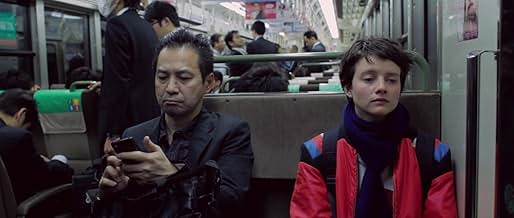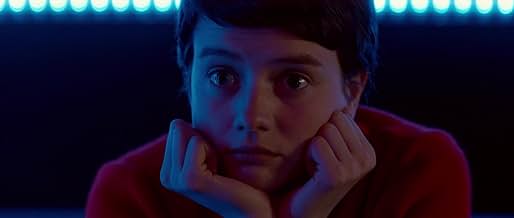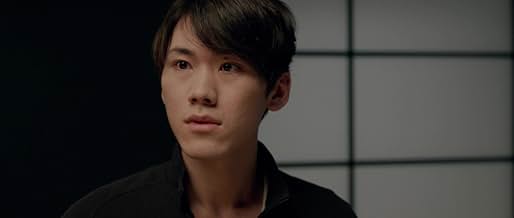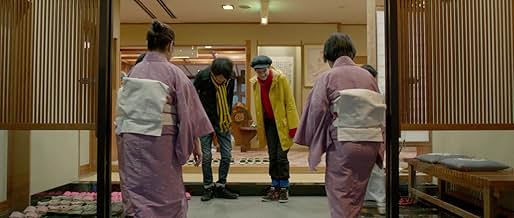Tokyo Fiancée
- 2014
- 1 Std. 40 Min.
IMDb-BEWERTUNG
6,4/10
2290
IHRE BEWERTUNG
Füge eine Handlung in deiner Sprache hinzuA young Japanophile Belgian woman in Tokyo falls into a whirlwind romance with a Francophile Japanese student.A young Japanophile Belgian woman in Tokyo falls into a whirlwind romance with a Francophile Japanese student.A young Japanophile Belgian woman in Tokyo falls into a whirlwind romance with a Francophile Japanese student.
- Regie
- Drehbuch
- Hauptbesetzung
- Auszeichnungen
- 3 Nominierungen insgesamt
Julie Le Breton
- Christine
- (as Julie LeBreton)
Tan Huynh
- Japanese student
- (Nicht genannt)
Empfohlene Bewertungen
It's very common in the western films about interracial romance, mainly because it's happening and that's how the societies are made, particularly the North America. And it's not same when you seek similar themed films from the east. It is a less explored concept as far I know. Even this one is a Belgium film that entirely takes place in Japan.
I like this kind of film. It helps to realise what are all kinds of complications we could face in the same situation. In fact, I'm too a Japanophile, as well as Francophile. So this film is both of them. It's a cross culture, but fun to experience, especially if you adore that culture as much as your own life.
This film was about a young Belgian woman named Amelie, who actually was born in Japan, but later in her childhood she had returned to native along with her parents. Now in her 20s, she came back for the love she has for Japan. The first thing she does was advertising about her private French tutorial. Then she gets a student, a young Japanese fellow who already somewhat knows the language. They roam the city, experience the culture and society, and picks up the words, which is translated to French as part of learning/teaching.
As expected, they fall in love and that's where the trouble arises. Because it's not America, where a Japanese man and a French woman has no complications, particularly culturally. But here the cultural significance stands between them. The language of romance is universal, but how to express it in behaviour is a series of obstacle.
Amelie loves everything about Japan, even she climbs Mr Fuji to be a true Japanese and it helps her to rediscover herself in the tough time. Yet she finds a little hard to adapt the way of Japanese lifestyle. Possibly in every single thing. From raw food to falling in love, meeting her future in-laws, getting engaged and all.
❝A real Japanese has to climb Mt Fuji.❞
I thought the film would be in the line of 'My Darling is a Foreigner', but it was like 'Amélie' and 'Citizen Dog'. It's more a girlish kind of film, but can be enjoyed by all category adult audiences. The character Amelie is similar to those two titles from the above I mention. You will like her, probably fall for her. The film looks beautiful mainly because of her, the actress who played it was the backbone of the film. When everything was going quite nicely, then all the sudden an unexpected conclusion emerges. I really did not like it.
My first reaction was, how could possibly they ruin this beautiful film with such a bad end. I thought the writer failed to come up with something to make a better climax. I was disappointed with the finale, but my stance changed when I learnt it was a biopic, which I did not know earlier. Yep the film was based on the autobiographical book of the same name.
The story sets in around the time Fukushima nuclear disaster, but the problem is the dates does not match, as the book came years earlier. Anyway, that event has a big influence to this tale to wrap up. So when a film is based on the real, I like as it is than any alteration. From the outside, it looks like 'Before Sunrise', but there are lots of differences.
What this film teaches us is, it's easy to love other cultures, but proving isn't. There should be lots of sacrifices to be made, especially if is a relationship, not love found in the culture as an individual person. The film was very enjoyable. You can learn many things about Japan through the film.
The casting was excellent and so the locations. Probably a bit underrated film, as well as not recognised widely. Those who saw it, considering it from the entertainment perspective, but most them are not aware that it was inspired by the real. I think it is worth a watch, especially if you love Japan and its culture, definitely not to be missed.
7/10
I like this kind of film. It helps to realise what are all kinds of complications we could face in the same situation. In fact, I'm too a Japanophile, as well as Francophile. So this film is both of them. It's a cross culture, but fun to experience, especially if you adore that culture as much as your own life.
This film was about a young Belgian woman named Amelie, who actually was born in Japan, but later in her childhood she had returned to native along with her parents. Now in her 20s, she came back for the love she has for Japan. The first thing she does was advertising about her private French tutorial. Then she gets a student, a young Japanese fellow who already somewhat knows the language. They roam the city, experience the culture and society, and picks up the words, which is translated to French as part of learning/teaching.
As expected, they fall in love and that's where the trouble arises. Because it's not America, where a Japanese man and a French woman has no complications, particularly culturally. But here the cultural significance stands between them. The language of romance is universal, but how to express it in behaviour is a series of obstacle.
Amelie loves everything about Japan, even she climbs Mr Fuji to be a true Japanese and it helps her to rediscover herself in the tough time. Yet she finds a little hard to adapt the way of Japanese lifestyle. Possibly in every single thing. From raw food to falling in love, meeting her future in-laws, getting engaged and all.
❝A real Japanese has to climb Mt Fuji.❞
I thought the film would be in the line of 'My Darling is a Foreigner', but it was like 'Amélie' and 'Citizen Dog'. It's more a girlish kind of film, but can be enjoyed by all category adult audiences. The character Amelie is similar to those two titles from the above I mention. You will like her, probably fall for her. The film looks beautiful mainly because of her, the actress who played it was the backbone of the film. When everything was going quite nicely, then all the sudden an unexpected conclusion emerges. I really did not like it.
My first reaction was, how could possibly they ruin this beautiful film with such a bad end. I thought the writer failed to come up with something to make a better climax. I was disappointed with the finale, but my stance changed when I learnt it was a biopic, which I did not know earlier. Yep the film was based on the autobiographical book of the same name.
The story sets in around the time Fukushima nuclear disaster, but the problem is the dates does not match, as the book came years earlier. Anyway, that event has a big influence to this tale to wrap up. So when a film is based on the real, I like as it is than any alteration. From the outside, it looks like 'Before Sunrise', but there are lots of differences.
What this film teaches us is, it's easy to love other cultures, but proving isn't. There should be lots of sacrifices to be made, especially if is a relationship, not love found in the culture as an individual person. The film was very enjoyable. You can learn many things about Japan through the film.
The casting was excellent and so the locations. Probably a bit underrated film, as well as not recognised widely. Those who saw it, considering it from the entertainment perspective, but most them are not aware that it was inspired by the real. I think it is worth a watch, especially if you love Japan and its culture, definitely not to be missed.
7/10
Amélie (Pauline Etienne) was born in Kansai but she is Belgian, unfortunate twist of fate as she stubbornly wants to become « a venerable Japanese writer ». So at the age of 20 Amelie leaves Belgium for Japan to realize her dream. There, to earn her living, she teaches french to Rinri (Taichi Inoue), a young Japanese french culture enthusiast, as sweet and charming as he is sometimes impenetrable
From the ryokans on Sado Island to the streets of Shinjuku, in the intimacy of a cozy room on a rainy and bathing in the hot water of onsens, Amélie and Rinri take a great delight in being together, like enamored kids exploring the pleasures of love, between complicity, fondness and sensuality. But in the mist of discovery and fantasy, it is sometimes difficult to answer the most important : who am I, what do I want ?
Through breast-taking shots of Japanese city, suburbs, rivers and mountains, Stefan Liberski offers a coming-of-age film in the form of a playful comedy, funny, light but not always as light as it seems, brought to life by a remarkable pair of actors.
"Delicious, yes, that's the word."
Through breast-taking shots of Japanese city, suburbs, rivers and mountains, Stefan Liberski offers a coming-of-age film in the form of a playful comedy, funny, light but not always as light as it seems, brought to life by a remarkable pair of actors.
"Delicious, yes, that's the word."
Being a certified Japanophile I did enjoy this film, but realize it is not for everyone. There were many fascinating shots of different locales throughout
Tokyo and nearby Hakone, including a breathtaking view of Fuji San.
The actress in the lead part did remind me somewhat of Audrey Tautou in "Amelie," but was not entirely convincing as a romantic partner. Although nominally a full-grown woman, age 20, she looked much younger.
The bulk of the film centers around the developing relationship between Amelie and her Japanese student Rinri. She starts helping him improve his French language skills, and they grow closer. It is never quite clear to me, at least, whether their attraction is personal or cultural, which may be one of the messages of the film.
For a much more interesting view of a relationship between a Japanese man and a non-Japanese woman, take a look at the YouTube channel "Rachel and Jun" which is about a charming young married couple. Rachel is from the U.S. and Jun is native Japanese, but whose command of English is extraordinary.
The actress in the lead part did remind me somewhat of Audrey Tautou in "Amelie," but was not entirely convincing as a romantic partner. Although nominally a full-grown woman, age 20, she looked much younger.
The bulk of the film centers around the developing relationship between Amelie and her Japanese student Rinri. She starts helping him improve his French language skills, and they grow closer. It is never quite clear to me, at least, whether their attraction is personal or cultural, which may be one of the messages of the film.
For a much more interesting view of a relationship between a Japanese man and a non-Japanese woman, take a look at the YouTube channel "Rachel and Jun" which is about a charming young married couple. Rachel is from the U.S. and Jun is native Japanese, but whose command of English is extraordinary.
A romance comedy without clichees , that's very rare, and all beccause my favourite writer, the best of our days Amelie Nothomb,Pity the most of her novels can't be ecranized.
Tokyo Fiancée is an initiatory trip to finding your identity, Amélie (Pauline Etienne) embarks on a journey to find herself. Born in Japan from Belgian parents, she leaves Belgium for the country of her dreams, Japan. Marveling at a culture and a language she feels she missed out on and wants to absorb, but the metamorphosis is not as swift as she had hoped.
The film has the sensibility and beauty of Japanese and French film making. It's sweet, innocent and a bit dark. Slowly immersing the audience into a country, a city, and a culture it introduces Japan beautifully through Amélie and Rinri (Taichi Inoue)'s eyes. They both aspire to learn from each other and almost inevitably become close.
Amélie and Rinri may be culturally different but they seem to share the same quirkiness. The actors are both touching in the film, they made Rinri and Amélie feel real and natural. Pauline Etienne smartly portrayed Amélie's bubbly personality and her evolution throughout the movie. The movie also smartly integrated the events of Fukushima in the story, making the horrid fit into the atypical love story.
Tokyo Fiancée is not exactly a love story, more of a friendship love story. It shows Japan brilliantly, as exciting and slightly confusing as that it may be.
The film has the sensibility and beauty of Japanese and French film making. It's sweet, innocent and a bit dark. Slowly immersing the audience into a country, a city, and a culture it introduces Japan beautifully through Amélie and Rinri (Taichi Inoue)'s eyes. They both aspire to learn from each other and almost inevitably become close.
Amélie and Rinri may be culturally different but they seem to share the same quirkiness. The actors are both touching in the film, they made Rinri and Amélie feel real and natural. Pauline Etienne smartly portrayed Amélie's bubbly personality and her evolution throughout the movie. The movie also smartly integrated the events of Fukushima in the story, making the horrid fit into the atypical love story.
Tokyo Fiancée is not exactly a love story, more of a friendship love story. It shows Japan brilliantly, as exciting and slightly confusing as that it may be.
Wusstest du schon
- WissenswertesBased on Amélie Nothomb's love affair with Rinri Mizuno when she was living Japan in her early twenties. Although the real-life events took place in the early 1990s, the director set the film in the early 2010s. The real-life events narrated in Tokyo Fiancée took place at the same time than those narrated in Mit Staunen und Zittern (2003).
- VerbindungenFollows Mit Staunen und Zittern (2003)
- SoundtracksBig in Japan
Performed by Ane Brun
Top-Auswahl
Melde dich zum Bewerten an und greife auf die Watchlist für personalisierte Empfehlungen zu.
- How long is Tokyo Fiancée?Powered by Alexa
Details
Box Office
- Weltweiter Bruttoertrag
- 167.230 $
- Laufzeit
- 1 Std. 40 Min.(100 min)
- Farbe
- Seitenverhältnis
- 2.35 : 1
Zu dieser Seite beitragen
Bearbeitung vorschlagen oder fehlenden Inhalt hinzufügen























